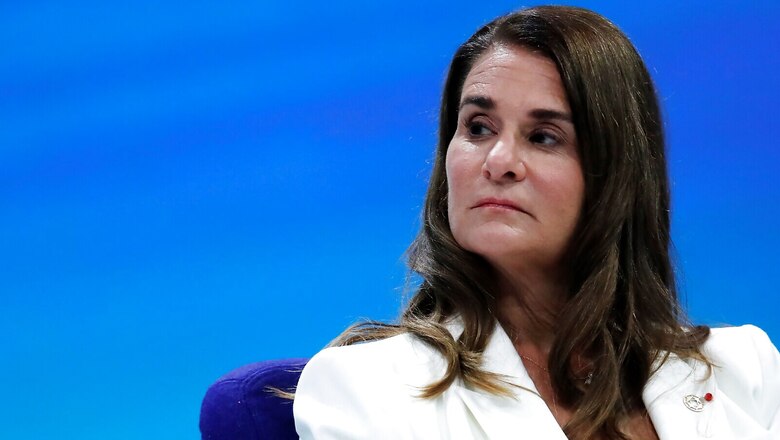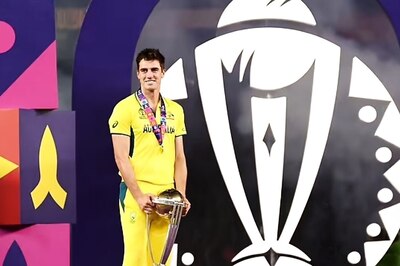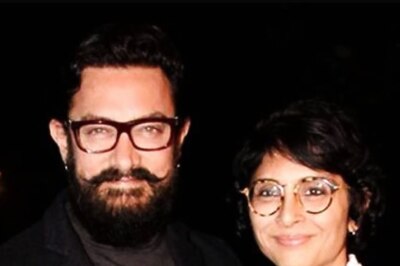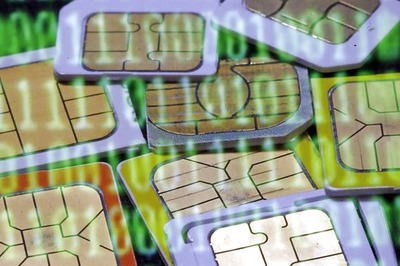
views
Melinda French Gates, co-chair of the Bill and Melinda Gates Foundation, is on a visit to India. While meeting top representatives of the government and ordinary Indians, she’s eager to find out what has changed here since her last visit, and what more can. In an exclusive interview with CNN-News18 on Tuesday, she spoke at length about India’s Covid vaccination model, its digital strides, hosting G20, putting women in positions of power, and areas that need improvement. Edited excerpts:
Seven years now since you last visited; what has changed for you?
So much has changed in India. I think the digital peace is so apparent now. I knew of all the work that was built underneath of that, but now to see it changing citizens’ lives…now they can have digital bank accounts, 470 million bank accounts have been opened, half of which are women-led bank accounts. Everybody has an ID card, getting Covid vaccination on your phone…digitalisation has really impacted people’s lives in a powerful way.
Did it surprise you that it was developed in the scale of the last seven years in India?
To see how quickly it has taken off…I knew about all the regulations, but to see it escalate so quickly…And I think Covid had a part to play with that, played a positive part.
In 2016, you said women need to get into science and technology. Even the recent Goalkeepers Report, you talked about not just empowering women but giving them more power. What’s your thought behind that?
We need to have women in positions of power, at all levels. We weren’t there anywhere around the world. Making sure that they are in science and technology, finance, politics, media. Women need to be there at the top and as I said, instead of empowering women, it’s about bringing women into their full power. It’s not enough that a woman has a good job, but if she doesn’t have somewhere to leave her children or child care, she can’t be there at her job for so many hours, or if she has a bank account but not in her name, or property not in her name, she is not fully empowered. So I think we need to shift and look for barriers around a woman and break those down so she can step into her full power.
How easy or difficult is it to achieve this?
It depends. In some societies, it’s easier to achieve. I am impressed with India’s commitment from the PM through the various ministries of the government.
PM Modi has talked about these things. What I see is action coming out of this government. Women and child welfare department…I was with them last night, hearing all ministries bringing gender policy into their programmes, seeing that the government is serious, those are important actions that you see is happening.
There is a lot of work that the foundation is doing on the ground here, so are you keen to go and have a look at it?
I will go to UP tomorrow and look at a lot of health systems. Yesterday, I was in a south Delhi community and I saw the transfer payment system, the postal system, and saw the women going out in the community and visiting women. 14 women coming together who all have bank accounts, and they were using them both making deposits and taking money out, and I talked to those women and asked questions like what does it mean to them to have money. All talked about how people around them see them differently and you see women’s agencies coming forward to make sure that every woman has digital bank accounts.
Does financial inclusion make such a big difference? Is the government working in the right direction? What do you think are the learnings that other nations can take from India?
I am looking forward to India hosting G20 this year and I think there are so many lessons that the world can take from India as it’s moving in the right direction on digitalisation for both genders to have bank accounts and then you can start to lay credit on top of that, and lending on top of that…when women have bank accounts and they can save even if it’s 1-2 dollars a day, they are planning for the future. I had a talk with these women, and they are thinking of their children’s education. That’s how the country will be empowered.
Will that also power innovation? Do you think that it will push more education within society and among women?
The government is opening new credit to women-led businesses and women entrepreneurs. I just spoke at an event here called ‘WomenLift’, which was about women in health. It is incredibly important to have more women scientists, women in computer technology, but even at the grassroots level, it is so often that women do have jobs in the informal sector, they see what society needs. So if they can start to do businesses and do that through their phone…
The pandemic was tough for all of us but you also said it was unequal for women…
It pushed women out of the labour force, the businesses were shut down, and people were home. Finally the invisible became visible. Women are expected in every society to take care of their children and the elderly. It is tedious. We saw men and women going back to jobs, but women were not going back at the same rate because there has been a crisis in the childcare sector. Until we address that, we are not going to get back women in the formal sector.
We saw in the pandemic, Asha workers and women across the country going and spreading this message of having to get vaccinated. Some of the stories are so inspiring. Do you think that the world needs to know those stories?
There are so many nations that need to learn from that. Asha workers are the frontline soldiers. Even before we got vaccinations, they were giving messages on hand-washing, wearing masks, social distancing, creating and distributing masks. When the vaccine was available, they were on the frontline and making people aware. There isn’t a health system that I know that wouldn’t like to have an Asha system.
Do you believe India can technically support these systems? How is it that we can take this learning forward and help other nations?
Through G20, really connecting Africa in south-south collaboration to help them see what was done in the open-source ID, digitalisation on financial pieces, making sure they understand and have that, and the right message would be implemented in their own countries. There are all these opportunities in India to build applications on top of digital rail. We are beginning to see the tip of the iceberg, there will be applications for Africa where they will find their own solutions. I know that other countries should learn from the cohort countries who have moved to low to middle-income economies, that is the collaboration that’s needed.
India has 4% of the landmass and 25% of the world’s population where 50% is women. What is it that it is doing right so far and what is it that we need to do to take this further?
I think India is really looking into the health sector while working on fewer women dying during childbirth, more children surviving, girls getting proper nutrition…I see India doing that not only for the middle class but also for the impoverished section. Those are incredible efforts. The self-help group is another innovative idea where 86 million women, in 8 million SHG, which are going now for 20-30 years. They move from a health base to entrepreneurship to leadership. You see them moving along in terms of knowledge and education and pulling others in. This model can be used in other parts of the world.
You see more women in technology in India and in health from the last time you came?
It seems, but I think yes, you are getting more women into science.
How is the approach being to diversity? You have pushed for diversity and advocated it. Do you believe that Indian corporates are now looking at it, there is perhaps more inclusion of women in top positions in leadership?
In the tech sector, yes, you see far more women coming, so I think they will get there sooner compared with other industries. It’s important for all industries to come forward…We look up and see three dozen men in every industry, so young boys can look up and say I want to be like them. Until young women can look up in every sector of society and see three dozen women in every sector, we are not there yet.
How much of this is because of women not being allowed to grow or is there a dearth of very capable women coming through the system, so there are two aspects which we have to look at? So which perhaps is evident for you?
We haven’t allowed them to get there in the past, so even, say in medicine. Finally, I think the Indian institutes are graduating the same amount of women doctors, but if you look at the top, surgeons’ positions are held by men or you look at the frontline workers, those are women, but you don’t see a ton of women running hospitals. That is because we held them for a long time, we have to look at the barriers and clear the way so as to see them there.
How can women manage this, because much more is expected from women than men? They are nurturers, nourishers, and developers. There is so much that a woman is capable of compared to a man. And when you say women need to come to industries, there is a compromise that happens because someone has to take care of that. Society is a big challenge.
I think that society has put that on women, and said that it is women who nurture children, to be there, help with tears, fill lunch boxes. In Nordic countries where they have things like very robust paid medical leaves policy for over 30 years, not just women take out time at the time of birth but the men also, and once he does, he helps more with the child, with the course of life. We need to change societal norms, where women can do both the things.
What are the goals for you, as co-chair of the Gates Foundation?
I want to see women in more places in society. That is a big goal. And I also want to see children vaccinated. India is a model for this. Even during Covid 2.0, vaccines were made here…and having that focus to save lives, I love to see more of that around the world.
As life throws a lot of curve balls at us, what gives you hope and optimism?
Even if you meet a man or woman who is starting a new business or figuring a way to get their kids into schools…there isn’t a person I have ever asked anywhere in the world, when I ask them what their hopes and dreams are, they always talk about their kids. And so it gives me hope to see people working towards a future where life is better for everybody.
Read all the Latest India News here




















Comments
0 comment